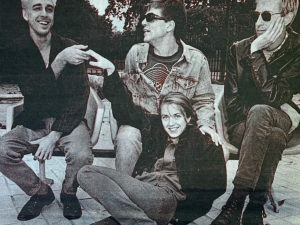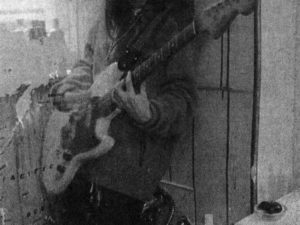THE TALE OF EXILE IN Guyville, Liz Phair’s inspired double-length debut album, comes complete with all the trappings of a TV miniseries — obsession, misperceptions, plenty of sex — only without commercial interruption or Jane Seymour. Heaven
And at the center of all these tabloid buzzwords, Phair — a 26-year-old Chicago resident and former art major — is standing five feet two and loving her life.
“I am a happy person right now because I do what I want to do,” says Phair, sitting in the middle of New York City’s Washington Square Park, laughing and currently doing exactly what she wants to do. Namely, indulging in her favorite guilty pleasure — smoking pot having finished a close second — the self-described and not particularly politically correctly termed chick watching. “It has nothing to do with the fact that people like my album. It has to do with the fact that I made my album. No approval can win you like your own respect.”
Of course, it helps to have enough great reviews lying around to be able to wallpaper your own home studio. That’s a working situation that Phair might just find ideal. Phair polished off a double album before realizing it might be a good idea to play live — an exercise, it must be noted, that she abhors. Not that she was locked in the attic turning her diary into a rock opera.
“I didn’t want to be some kind of shut-in with a four-track,” says Phair. “It wasn’t this deep, dark, horrible thing. I always worked in a really playful way.”
The music on Exile in Guyville certainly bears her out. Spare, tough and unapologetically catchy, the 18 songs owe as much to Phair’s beloved campfire songs as they do to classic-rock radio. It’s just that no FM radio station seems to play lean, driving pop songs until after they’ve aged 10 years, and no Girl Scouts going to make s’mores and blurt out lines like the ones in “Help Me Mary”: “They make rude remarks about me. They wonder just how wild I would be… I’m asking you, Mary, please. Temper my hatred with peace. Weave my disgust into fame. And watch how fast they run to the flame.”
“Help Me Mary”, in fact, spits in the face of all the guys in Guyville — the male-dominated, uber-indie-rock mentality that Phair’s friends in Urge Overkill first ridiculed in their song “Goodbye to Guyville” on their EP Stull.
“Guyville is a state of mind,” says Phair. “If you aren’t [a guy], you know one, you dated one, or you gave birth to one.”
Urge bassist Ed Roesser concurs. “I don’t want to tell all the guys in Guyville how cool or scary their bands are,” says Roesser. “That’s why people like Liz are so important. She’s writing great songs, and she’s doing it all herself.”
And then there’s the little thing about Phair’s Rolling Stones fixation.
Her obsession, it turns out, has turned into a vocation. Phair might be young enough to be Mick Jagger’s daughter, but she’s also compulsive enough to have fashioned Exile in Guyville into a response to the Rolling Stones’ Exile in Main Street and talented enough to pull it off without sounding like a novelty act or allowing anyone ever to listen the Stones’ classic in quite the same way again.
And if all that doesn’t toy with enough perceptions of the rock myth, take a peek at the packaging (or is that unpackaging?) of Liz Phair. Exile in Guyville‘s blurry cover photograph features a snarling Phair — flashing. The inside reveals what would be much more compromising Polaroids of Phair if, in fact, the model in question wasn’t actually a woman named Kristi Stevens.
“My sexuality was going to be packaged for me, so I did it myself,” says Phair. “People kept saying, ‘How could she exploit herself?’ And I did. On the cover, there’s the tiniest bit of nipple showing. Yet I didn’t, because the inside photo isn’t me. What is that saying about images?”
And if sexual candor is what best challenges the complacent listener, Exile in Guyville is a musical obstacle course. This is one aspect of the album that is quite self-explanatory. It stands out not only in song titles — “Fuck and Run” springs to mind — but in lyrics that often leave no room for misinterpretation. “Flower”, in fact, ends with the pronouncement: “I’ll fuck you till your dick is blue.” Yep, the sexual terrain seems pretty well charted.
“Men are a lot more freaked out by my work than women,” says Phair. “Men are not aware that these are things that nice women from good families are thinking. It unsettles them.”
When time came to utter the words “Mom, Dad, I wrote this album…,” it was Phair’s turn to be unsettled. Her mother (who works at the Art Institute of Chicago and teaches art in the public-school system) and her father (an AIDS researcher and chief of infectious diseases at Northwestern Memorial Hospital) handled it as well as any parents hearing their daughter croon “I want to be your blow-job queen” ever have.
“They handled it so well,” says Phair. “But it was scary as shit. I waited a year.”
Next thing she knew, Phair was being touted as a feminist spokesperson. It’s a job she’d like to share.
“This is the call to young girls who have the ability to compete,” says Phair. “Get out there and slug it out. There’s not enough female voices in popular culture. It’s a fucking crime.”
Phair — who forsees seguing from music to working in film or writing a book in the next few years — is well aware that having her name associated with self-empowerment catch phrases come complete with its own Catch-22. Her answer is a smile that breaks into a laugh.
“They started chiseling my tombstone the minute I was championed as a spokesman,” says Phair. “The minute you’re put in that box, people start making way for the next person. But I’m 26; I’m not as jealous as I used to be, and I think that’s just fine.”
By Chris Mundy
Rolling Stone, Issue 667, October 14, 1993







